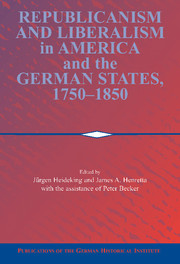Book contents
- Frontmatter
- Introduction
- PART I OVERVIEW
- PART II THE REPUBLICAN WORLD
- 2 The Concept of the Republic in Eighteenth-Century German Thought
- 3 Kant’s Republicanism and Its Echoes
- 4 Constitutions, Charity, and Liberalism by Default: Germany and the Anglo-American Tradition
- 5 Politics and Sentiment: Catharine Macaulay’s Republicanism
- 6 Between Liberalism and Republicanism: “Manners” in the Political Thought of Mercy Otis Warren
- PART III THE TRANSITION FROM REPUBLICANISM TO LIBERALISM
- PART IV THE LOGIC OF LIBERALISM
- Index
3 - Kant’s Republicanism and Its Echoes
Published online by Cambridge University Press: 05 January 2013
- Frontmatter
- Introduction
- PART I OVERVIEW
- PART II THE REPUBLICAN WORLD
- 2 The Concept of the Republic in Eighteenth-Century German Thought
- 3 Kant’s Republicanism and Its Echoes
- 4 Constitutions, Charity, and Liberalism by Default: Germany and the Anglo-American Tradition
- 5 Politics and Sentiment: Catharine Macaulay’s Republicanism
- 6 Between Liberalism and Republicanism: “Manners” in the Political Thought of Mercy Otis Warren
- PART III THE TRANSITION FROM REPUBLICANISM TO LIBERALISM
- PART IV THE LOGIC OF LIBERALISM
- Index
Summary
Today republicanism is purely an academic concept. It is used to refer to a tradition of political thought that arose in antiquity and disappeared in the nineteenth century. For the past twenty years, particularly in the United States, this tradition of “classical republicanism” has been the focus of an academic discourse that continues to the present day.
The term itself played a role at a turning point in the republican tradition, although this has hardly been noticed and rarely discussed. The earliest evidence comes from the decade of the French Revolution, when the first modern republics were being established in Europe. In Germany, it was the philosopher Immanuel Kant who first threw the concept of republicanism into the political debate. In doing so, he opened up a discourse on republics and republicanism that can be traced in a broad sweep through to the revolution of 1848.
In the thematic and chronological framework of this chapter, I focus first on the new meaning of republicanism, its origin and spread in Germany, and its meaning from the perspective of Begriffsgeschichte (history of concepts). I then investigate Kant's writings more closely to explain his conception of republic and republicanism. Finally, I examine the context and traditions within which Kant’s republicanism stood. Proceeding from these explorations into the genesis of the concept, I inquire in three stages into the further development of republican thought in Germany: in the years around 1800, in the era following the antirepublican backlash in European constitutional history initiated by Napoleon in 1804, and, finally, in the Vormärz republicanism that began in 1830 and reached its climax in the first months of 1848, the year of revolution.
- Type
- Chapter
- Information
- Publisher: Cambridge University PressPrint publication year: 2002



